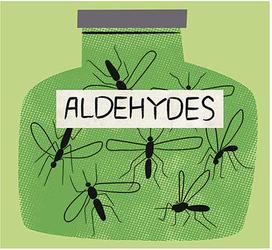As a child in Rochester, New York, Lindy McBride spent as much time as possible outdoors. “I was always really interested in being outside: camping, animals, plants,” she says. “My aunt’s a bird-watcher, so she got me into that, too.”
After graduating from Williams College with a degree in biology, she worked as a field researcher in Peru and a Fulbright Fellow in Tanzania. During that time, McBride became particularly interested in species evolution, diversity, and genetics, setting her sights on mosquitoes. “I wanted to study something that I could manipulate, that I could actually bring into the lab and mate between species.” McBride, who earned her Ph.D. in population biology from the University of California, Davis, is an assistant professor in the Princeton Neuroscience Institute and the Department of Ecology and Evolutionary Biology. She adds, “I became interested in [these] mosquitoes because they provide this really striking and recent example of adaptation.”
McBride’s Work: A Sampling

The One They Want
Of the more than 3,000 species of mosquitoes worldwide, only a few prefer biting humans to animals. McBride wanted to understand this “evolution of preference.” By researching Aedes aegypti in Africa, she and her team found that it likely came down to water access. In places where there was a long dry season — up to 10 months of drought — the mosquitoes heavily gravitated to humans. “Mosquito larvae are aquatic. They need water to survive,” McBride explains. Human settlements provided the bugs with water storage containers such as tanks, discarded tires, and plastic jugs. “Once you rely on humans for breeding, it may make sense to also bite them.”

Sweet Attraction
McBride wondered what exactly was taking place in mosquitoes’ brains to make them seek out human odor. By engineering the bugs’ neurons to show their electrical reactions to scents, her team found that the brains of people-preferring mosquitoes are much more sensitive to compounds known as long-chain aldehydes, which are highly concentrated in human skin oils. With this knowledge “we may be able to come up with safe and effective ways to reduce how attractive we are,” McBride says. This could result in better topical repellents, as well as improved synthetic bait to attract and trap the bugs, thereby reducing populations in areas where they are major vectors of diseases including dengue fever, yellow fever, and the chikungunya virus.

From Birds to Humans
Culex pipiens, the species of mosquito that carries West Nile virus, lives above ground in temperate regions, such as New Jersey, and feasts on birds. But recently, the species has evolved a new branch of underground mosquitoes that dwell in city basements, subways, and water systems. These metropolitan mosquitoes seek out not birds, but humans and other mammals. “It’s a fascinating dichotomy,” says McBride, whose lab is working to understand more on the population’s divergence. “What is it about their sense of smell that makes them attracted to birds on the one hand and mammals on the other?”











0 Responses